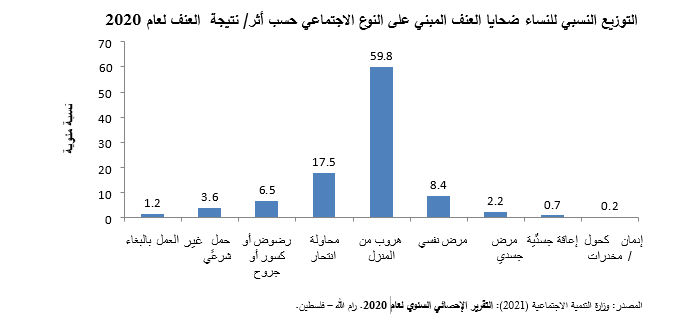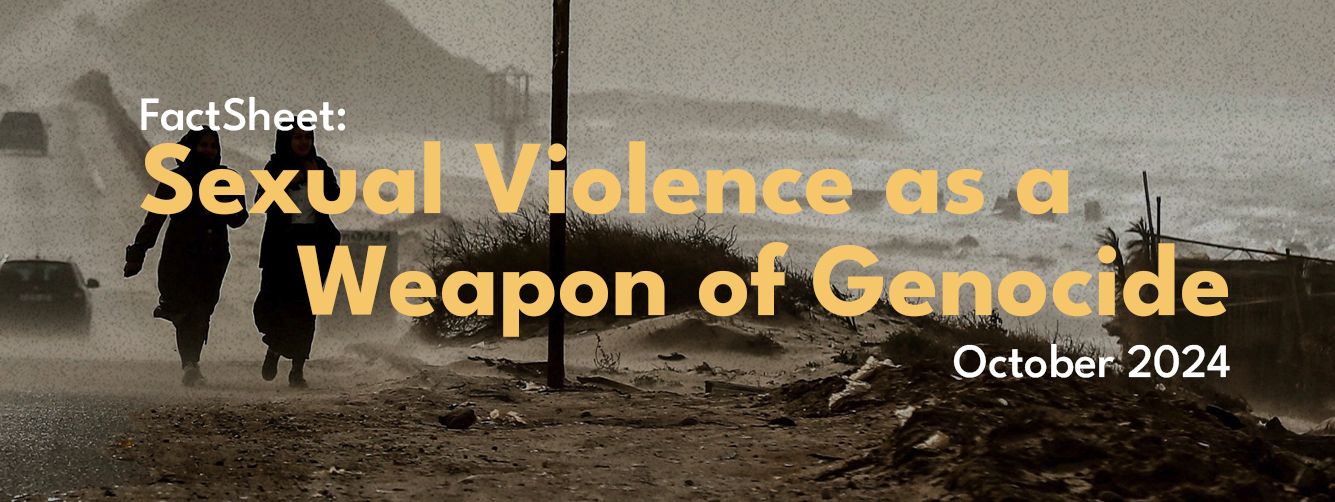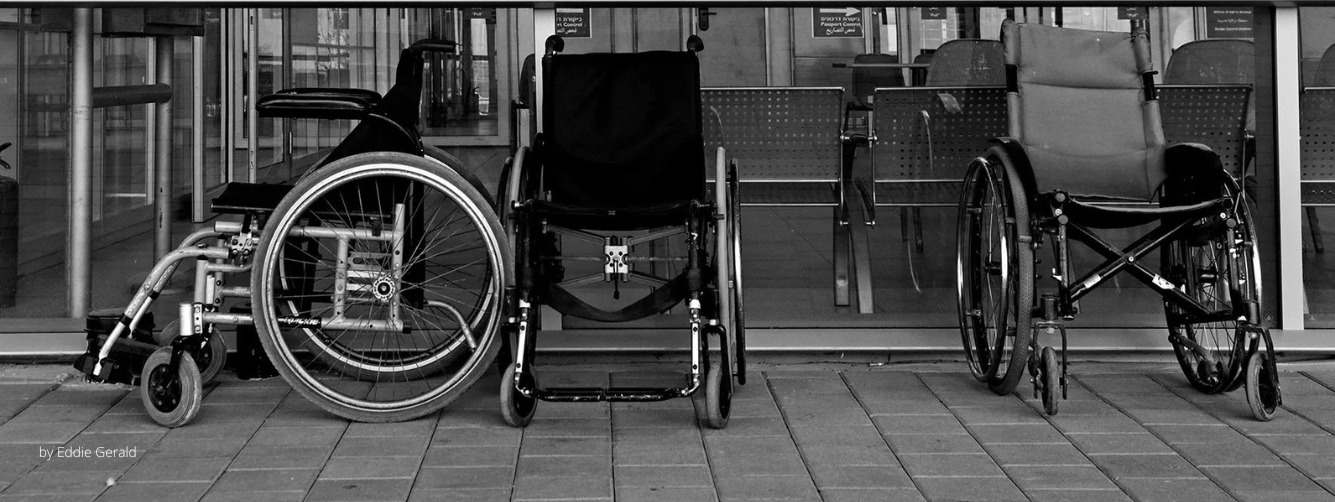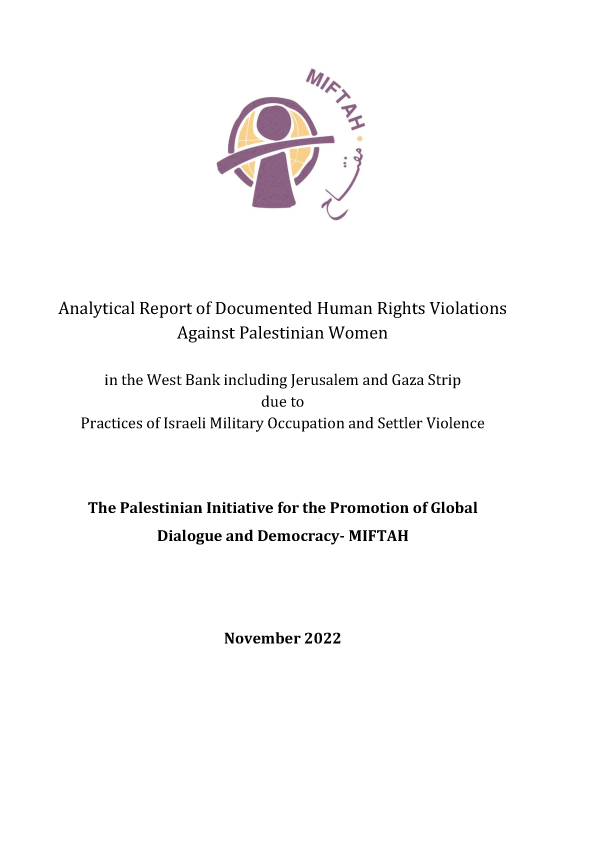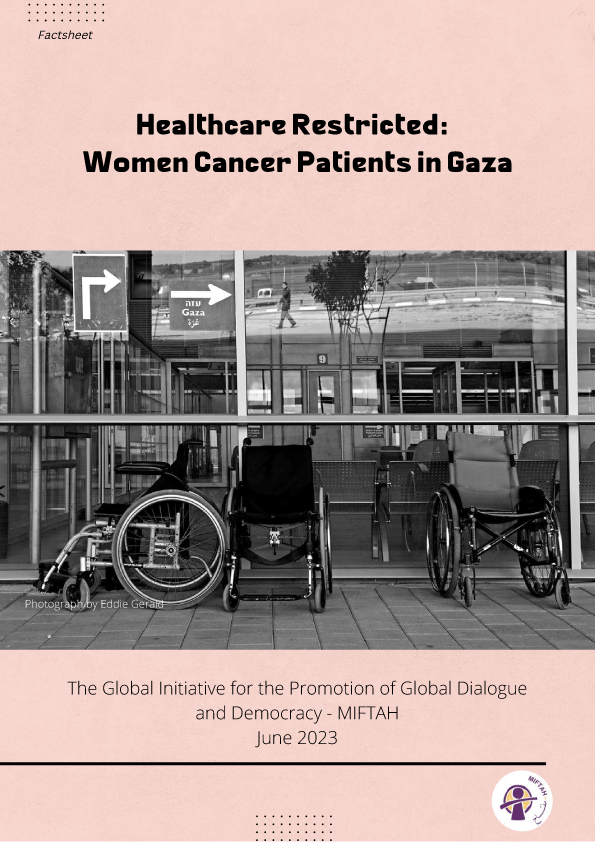![]()
The legislation of the family protection bill is aimed at the protection of the family itself as an institution, and to guarantee its preservation. Palestinian legislators are aware of the importance of this bill, which is why all ministries and official institutions committed to developing its relevant programs, policies and plans, each according to their field of expertise. Their goal is to contribute to the promotion of a culture that combats domestic violence and encourages the response of public policies to this objective, through education, health, legislation and the media. Another objective is to track the bill’s impact and periodically assess it in cooperation with other civil societies. This paper focuses on some of the financial indicators pertaining to this bill.
All family members in Palestine are subjected to violence, including children, minors, women and men. However, married women remain the sector most vulnerable to domestic violence according to a 2019 Palestinian Central Bureau of Statistics survey. It said 29.4% of married women had been subjected to at least one type of violence by their husbands as opposed to 13% of men who had been subjected to violence by their wives, by their own confession. A total of 44.7% of individuals who have never been married have been subjected toviolence;7.6% of the elderly and 44.2% of children(12-17yearsold) were the victims of violence at the hands of one of their parents. Although a high percentage of women have been victims of violence from their spouse, a considerable percentage of these women, around 60.3% preferred to stay silent about the assault. Only a small percentage of women asked for help through official avenues; 2.9% went to a defence lawyer to file a lawsuit against their husbands, 1.3% went to the police or a family protection unit and 1.4% went to the centres for mental, social and legal aid.
Financial indicators for the Family Protection Bill
| Article of Bill/Law by Decree | Relevant party | Estimated cost |
| Article(4) specialization of Ministry of Social Development: The Ministry, in cooperation with government and civil society organizations, provide the following services to victims of domestic violence: 1.Protection and fulfilment of needs of the victim; economically and socially empowering her and reintegrating her in society in order to preserve the family fabric, while ensuring not to equate the victim with the perpetrator. 2.Appointing protection counsellors in all directorates and qualifying them to deal with domestic violence cases 3.Providingsocial, psychological and legal experts to provide victim support 4.Ensuringthe provision of social, psychological, health and legal services to domestic violence victims in coordination with relevant parties. 5.Preparing rehabilitation programs for perpetrators of domestic violence crimes 6.Coordination and cooperation with government and civil society organizations to provide the necessary training for the enforcers of this law by decree. Preparing the necessary preventative plans and programs against domestic violence |
Ministry of Social Development | ILS12 million over 3 years on average of ILS4 million year, based on a study prepared by the Ministry of Social Development |
| Article 6: Family and Minors Protection Police: In accordance with the provisions of this bill/law by decree, a family and minor protection police will be established, with branches set up in all districts of the homeland. It’s specializations are the following: 1.Goingtothe place of the domestic violence incident when the informer states that the violence has occurred, is about to occur is ongoing; or in case of violation of a restraining order, even if the informer is not the victim 2.Providingfree 24-hourhotlinestohelp victims |
Palestinian police and Family and Minors Protection Department
Reform and Rehabilitation Centres Department |
ILS7.3 million/year (the study is based on the number of those working in the family and minors protection department and their mean salary)
ILS1.3 million/year (the study is based on the number of those working in reform and rehabilitation enters, which includes special sections for women boarders) |
| Article7: Family Protection Prosecution 1.In accordance with the provision of this bill/law by decree, a prosecution’s office will be established to follow up on domestic violence cases in all districts and will operate under the supervision of the Attorney General in accordance with penal measures in force. 2. This family protection prosecution office will promptly investigate domestic violence incidents while also preserving the privacy and dignity of the victim |
Family Protection Prosecution | ILS1.7 million, based on the number of relevant prosecution agents and their mean salaries |
| Article10: parties qualified to issue restraining orders 1.Restrainingorders will be issued by the following parties of their own accord: a. Family Protection Prosecution b. The presiding judge |
Presiding judges | ILS1.9 million, based on the number of judges and their mean salaries |
| Total expected estimated cost | ILS16.2 million |
The table above shows that the estimated and main additional cost of the Ministry of Social Development to be around ILS4 million a year, considering that the other parties (police, prosecution and courts) are currently carrying out their roles without fully allocating specialized departments for protection from violence. However, if these parties do allot specialized departments for protection from violence, overall costs will reach approximately ILS16.2 million. Nonetheless, even if this cost is incurred, it still only comprises a small part of public expenditures, approximately 0.1%. Overall public expenditures for 2022 amount to approximately ILS16.2 billion, which means the cost of passing this bill and implementing its provisions will not constitute financial burden on the general budget and will not be an obstacle to ratifying the law by decree.
Furthermore, it should be noted that while it is imperative to calculate some of the costs resulting from violence against women, the reaerate the high costs as well. The secret social costs, which impact society as a whole. Data from the Ministry of Social Development showed (see graph), that violence exercised against women has prompted around 60% of them to flee their homes. Also, 18% of them attempted suicide in addition to suffering from mental and physical illnesses, unwanted pregnancies or others. Calculating expenses incurred from violence is not an easy process and there are no national data or figures that can measure the impact violence has on the state’s general budget due to the prevalent mentality towards violence as an issue associated only with women. This is especially true when the conversation is about the indirect and intangible effects of violence, including:
Violations of human rights; negative social, economic and political impacts; working women who get sick and need to take sick leave; lack of focus and productivity; impact of violence on children and academic failure; the rise in the percentage of school dropouts among children; the rise in long-term unemployment rates; the percentage of homeless children who become a burden on society; government expenditures for medical treatment; safehouses; therapy; monitoring cases of violence against women; individual expenses for following up on legal cases and lawyer fees; loss of income because of repeated absence from work or inefficacy; social expenses resulting from the breakup of the family; expenses of training individuals on how to deal with cases of violence; expenses for issuing laws and legislation on the protection of women from violence.
Confirmation of the above is that the UN believes the economic, social and health costs of violence against women are, to a large extent, undocumented and unrecognized. However, these remain colossal, according to researchers, specialists and defenders of women’s rights.
To view the full factsheet as PDF




